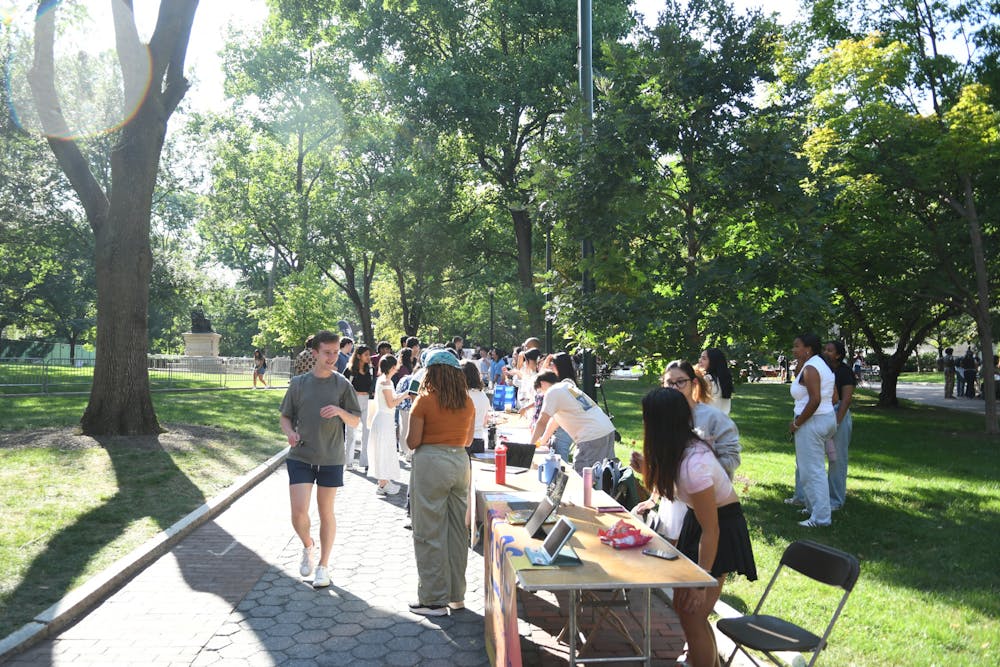
It’s no secret that applying to clubs and activities at Penn is a unique experience. From nationwide coverage about the notoriety of our “careerist” club culture to ever-persisting conversations about exclusivity and hazing, the consensus is that getting both socially and professionally involved at Penn is not easy. The barriers to entry have been discussed ad nauseam (as they ought to be), but one critical part of the problem is often glossed over in these conversations — people do not fully understand what they’re getting into.
Clubs at Penn are rarely purely social or purely professional. Of course, this has many advantages. A balance between both social and professional opportunities within a club can create a wonderful, more holistic experience for those involved. Additionally, a healthy amount of students do enjoy the secrecy of club activities and initiations. However, for some who don’t mesh, this theoretically wonderful dynamic can quickly go awry when a lack of transparency presents itself.
Consider the average first-year experience: you likely did extracurricular activities in high school, and you want to explore them at college. You’ve heard the application process is insanely competitive, but you’re eager to try. You’re ready for just about anything — that is, until you get in and realize your pre-professional club hazes.
This is not to insinuate that the majority of social aspects in clubs are inherently concerning or hazing adjacent. Social components don’t merit concern until optional mixers become required vacations and parties which not everyone would have the time, resources, or comfort to participate in. Cultivating a strong sense of social compatibility and familiarity is absolutely a worthwhile goal, but it’s certainly puzzling to see it manifest in quasi-hazing, secrecy surrounding initiations, and a combination of both professional and social pressure.
If clubs were more transparent about what their recruiting process truly entailed and the social-professional balance once accepted, it would be a huge net benefit to both applicants and interviewers. For applicants, being more well-informed about the atmosphere of a club would push them to apply to clubs they know they want to join or know they’d fit in with. This would narrow down the number of extracurriculars they would apply to, saving time and resources while they manage the stress of a new semester (often their first of college). Being more transparent would also mean recruiters would be more likely to fall in line with University processes surrounding hazing and misconduct, saving first years from a potentially traumatizing experience.
It’s also worth considering that part of the reason clubs aren’t completely transparent about application components and initiation processes is possible because the University would likely be upset with them.
For recruiters and interviewers, it would become a less exhausting process — it’s significantly easier to pick among a smaller pool of highly interested and aware candidates than it is to filter through a massive sea of half-interested, half-committed applicants who applied just in case they didn’t get into anything else. It’s a classic quality over quantity case for both applicants and interviewers.
One also has to wonder, what do the blurred lines between the social and professional say about the student experience in the first place? Penn’s cultural economy depends heavily on people who are passionate about the things they are a part of, and the things we are a part of are often — for better or for worse — a matter of professionalism, prestige, or some combination of both.
Do we gratuitously cross the social-professional line because we spend so much time doing academic and professional things that we can’t find time and people outside of them? To a certain extent, bonding over similar academic and professional interests is just the college experience. But shouldn’t we expand our social lives beyond our professional ones?
Despite qualms with the typical application process, it’s important to recognize that it is still extremely admirable that the student leaders who run these recruiting processes care enough to make new members’ social experiences more enjoyable. As students who went through these processes themselves, they understand what it is like to be an exhausted student in search of community. However, everything depends on perspective and one person’s idea of fun can be someone else’s idea of an anxiety-inducing night. Ultimately, increasing transparency would help gauge comfort levels and plan accordingly.
Although increasing transparency around what the social-professional balance looks like across different clubs would improve campus culture, people should still try to engage in social or community building activities outside of professional and academic spheres. Forming bonds in a pressure-cooker environment can certainly bring people closer, but simply put, it is good for the soul to be removed from social stress altogether in these professional spheres.
We would also benefit by remembering the wide array of ways people can bond within a social and professional capacity beyond extravagant secret rituals and semi-hazing; widening our scope of what constitutes a worthwhile social activity could make professional clubs a more inclusive space while maintaining organizational integrity and creating a socially tight-knit culture.
Balancing academic, professional, and social pillars is integral to the average college student's mental health, but these don’t all need to come from the same source — in fact, if they don’t, activities often feel more comfortable and professional. It is okay to separate the two, or to be clear about how they interact within a club from the get-go so that people understand exactly what they have signed up for. When it comes to social health and academic or professional fulfillment, the venn diagram cannot just be a circle.
ARSHIYA PANT is a College sophomore studying history and legal studies from Kansas City, Kansas. Her email is arshiyap@sas.upenn.edu.
The Daily Pennsylvanian is an independent, student-run newspaper. Please consider making a donation to support the coverage that shapes the University. Your generosity ensures a future of strong journalism at Penn.
Donate







